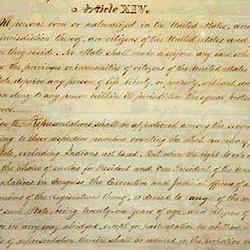Immigrant rights activists defend 14th Amendment
 By Deirdre Ruscitti, New America Media
By Deirdre Ruscitti, New America MediaThe debate over illegal immigration has moved to a new territory: the U.S. Constitution.
Under the 14th Amendment, U.S. citizenship is granted automatically to nearly everyone born in the United States, including the children of undocumented immigrants. (There are a few exceptions, such as the children of foreign diplomats.) This Constitutionally protected right, called "birthright citizenship," could be the next frontier for anti-immigration politicians and activists, who seek to deny citizenship to the U.S.-children of undocumented immigrants.
The latest attack on the 14th Amendment came from Sen. Lindsey Graham, R-S.C., who argued in an interview on Fox News that birth tourism -- parents coming to the United States for the sole purpose of giving birth to a child and getting that child U.S. citizenship -- "cheapens American citizenship." Graham said he supports an overhaul of the laws that govern who gets U.S. citizenship, the basis of which is the 14th Amendment.
The non-partisan Immigration Policy Center rejects Graham's views on birthright citizenship. "We are talking about changing the U.S. Constitution, the 14th Amendment, the cornerstone of civil rights," said senior policy analyst Michele Waslin. "Repealing birthright citizenship would affect every American and every child born in the U.S."
Changing the rules of citizenship would not only change the rules for the children of immigrants, but also for the children of citizens, notes Margaret Stock, an attorney who works with the Immigration Policy Center. If the 14th Amendment were revoked, a U.S. birth certificate would no longer be sufficient proof of citizenship, so every child would have to go through a lengthy bureaucratic process to show that they meet all the requirements of citizenship. Such a change could cost billions of dollars.
"Before we change the rules, we need to do a cost-benefit analysis here," said Stock. "There's absolutely no attention being paid to the practicality."
In order to change a Constitutional amendment, a second amendment must be passed to override the first one, which can be an incredibly difficult process. Two-thirds of Congress and three-quarters of the state legislatures would have to approve the amendment, a level of consensus that observers say would be almost impossible to reach on an issue as contentious as immigration.
"It politically can't be done," said Bill Hing, a professor at the San Francisco School of Law. "It can't be a serious proposal."
Immigration experts also note that birth tourism, the process that Lindsey stated as his motivation, is in fact a rare occurrence.
"There's maybe a very small group of people who are coming to the U.S. solely to give birth to a child," said Stock. Changing the Constitution to punish this small group of people, Stock continued, is an overreaction. "You don't hit a fly with a sledgehammer," she said.
Birth tourism has stayed limited, Waslin said, because a child's immigration status has no immediate effect on the status of the parents. Children who have U.S. citizenship have to wait until they turn 21 to sponsor their parents for a Green Card. "It doesn't make much sense to have a child here for citizenship reasons," she said.
For immigrant rights advocates, the larger argument against revoking birth citizenship is that it is a threat to civil rights. They note that the civil rights movement of the last century and a half has been derived from the 14th Amendment, and to repeal it would destroy much of our American identity.
"Never before have we the people amended the Constitution to make it less egalitarian," said Elizabeth Wydra, chief counsel of the Constitutional Accountability Center. "The provision of citizenship by right of birth was constitutionalized beyond politics and prejudices."
